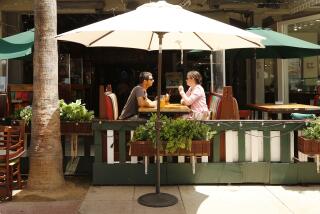Here a Fee, There a Tax--Extras Empty the Wallet
- Share via
Call it the niggle index.
I’m talking about those little extra costs that crop up here and there when a traveler is on the road. Not tips to waiters and hotel maids; a traveler should expect those. The niggle index is driven by other fees, taxes, surcharges, levies and recommended donations that often don’t show up in the advertised prices.
On better days, a traveler comes across only those merchants and local governments (masters at assessing taxes on visitors, who don’t vote in those elections) that see no honor in having customers nickeled and dimed to death. On such days, the niggle index falls, and a traveler finds a measure of hope.
But on a day when every little thing seems to carry its own price tag, I’ve seen the niggles push my expenses up by 30%.
A recent car rental experience in Colorado was a veritable niggle-fest. When all the calculations were done, I paid 29% more than the first price quoted, and I was powerless to do anything about it.
Here, in no particular order, is my top-five list of travel niggles. Some can be avoided. Others are inescapable. But either way, it’s better to be prepared for them.
Rental car add-ons. In dozens of U.S. airports, the daily rate of your rental car is just the beginning. You’re also likely to find a retail tax of about 8%, an airport concession fee of about 10% and other airport-related levies of as much as 3%, according to a survey of major U.S. cities by the Travel Industry Assn. of America, based in Washington.
Denver, from which I recently returned, is pricier than most. My Avis car cost $41 per day for five days, plus $1.60 per day in facility fees (that’s the rental car company defraying the cost of building its facilities) plus a 10% “concession recovery fee” (that’s the rental car company defraying the cost of leasing the land on which the facilities are built). On top of this there was a local tax of 13.05%, calculated on the total cost that includes the other fees. The result: a $41-a-day car cost almost $53 daily. And for those who returned with the tank less than full, the gas price was $3.99 a gallon. It’s not just Avis that levies. These practices persist among all the major rental car companies doing business at the Denver airport.
Hotel phone fees. The fancier the hotel is, the more likely it is to charge you 75 cents or more for every local call or calling-card call from your room. Why? Because hotels can boost profits by taking a cut of phone fees paid by guests. A 1998 survey by accounting firm PKF Consulting found that for every $100 a typical hotel spent on telecommunications, it raked in $227.05 in revenue from guests, a margin that rivals the profits hotels make on alcohol sales. It’s usually much cheaper, though less convenient, to call from a lobby pay phone. If you have a cellular phone, it might be cheaper to use that. Meanwhile, budget hotels and motels, notably the Motel 6 chain, frequently allow local and calling-card calls at no charge.
Hotel bed taxes. Hoteliers are blameless in this. The bed tax--the government tariff assessed on most hotel rooms in the U.S. and abroad--can add 10% to 20% to the hotel’s advertised rate. In some foreign countries, including Britain, the government requires hoteliers to include such taxes in the rates they quote so travelers know their total costs. But in many other countries (including Mexico) and throughout the U.S., taxes are excluded from quoted prices, either surprising travelers or forcing them into an extra mathematical step when figuring their costs.
Bed taxes averaged 12.36% in the top 50 destination cities in the U.S., researchers found in a 1998 survey of bed taxes by the Travel Industry Assn. The highest was Houston at 17%, a rate that’s still used.
Cruise ship incidentals. One reason for the growing popularity of cruises is the simplicity of an “all-inclusive” vacation. But the price you pay up front for a cruise will almost certainly be followed by other costs that are not as boldly advertised. One such cost is port fees, which some lines assess separately to cover expenses associated with port calls. They usually come to about $100, sometimes more, per person for all ports. Another cost involves land excursions in port, which can range from $30 to $300 or more, depending on the place. Yet another cost involves gratuities for waiters and room stewards. Following recommended amounts on mass-market cruise lines such as Carnival and Royal Caribbean, those tips add up to about $9 per person per day. (If you’re tempted to scrimp, remember that most shipboard workers are foreign nationals unprotected by U.S. wage laws. Their before-tips wages may be less than $3 per workday.)
Airline fuel surcharges. The airlines may change fares more often than Italy changes governments, but on the whole, unless you fixate on those $4 fees for headphones in coach class, the airlines haven’t niggled a lot--until recently. (Federal taxes, for instance, are built into advertised ticket prices.)
But then came the great fuel-price increase of early 2000. To cover their rising expenses--and to reduce their commission payments to travel agents and keep the price increase out of their advertised prices--several of the largest U.S. airlines decided to assess a “fuel surcharge,” typically $9.30 on one-way flights, $18.60 on round trips. The word “surcharge” may sound like a government tax, but this is just the airlines finding a way to pass along their increased overhead without changing their base prices. To complicate matters, the airlines haven’t imposed the surcharges uniformly. (A United spokesperson, for instance, notes that the carrier imposes the surcharge on some routes, but not on routes also flown by its competitor Southwest.)
When shopping for fares, ask for the price after all taxes and surcharges. If you’re online, look closely for an explanation of what is and isn’t included--and if it isn’t clear, call the airline and ask.
Christopher Reynolds welcomes comments and suggestions, but cannot respond individually to letters and calls. Write Travel Insider, L.A. Times, 202 W. 1st St., Los Angeles, CA 90012, or send e-mail to chris.reynolds@latimes.com.
More to Read
Sign up for The Wild
We’ll help you find the best places to hike, bike and run, as well as the perfect silent spots for meditation and yoga.
You may occasionally receive promotional content from the Los Angeles Times.







